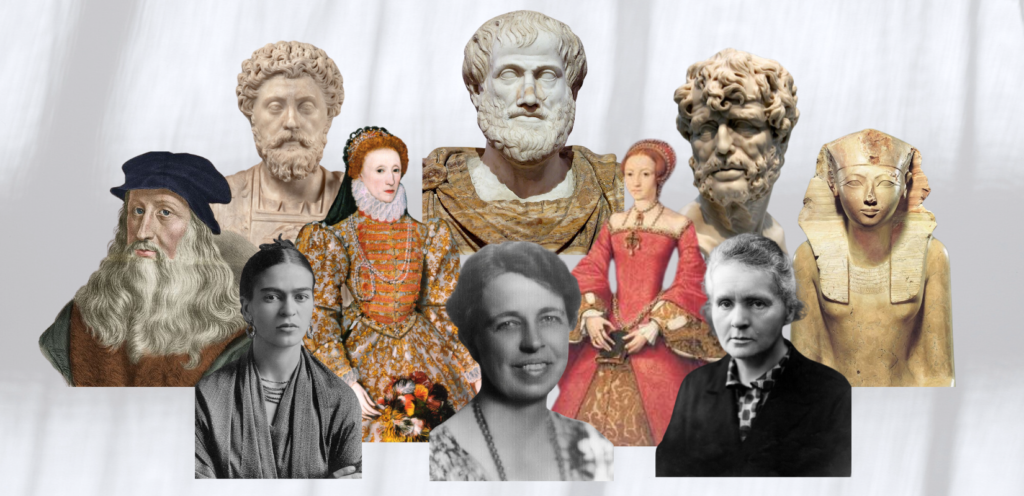
Since you’re here I will assume that you’re searching for some helpful personal development tips. You may have turned to self-help books, apps, or even the latest personal development and productivity strategies. But sometimes, looking to the past is the best way to move to the future. And what better way than to turn to some of history’s greatest thinkers for unique personal development tips?
This post dives into ten essential personal development skills for self improvement at home, work, or your personal life to succeed today. Gain a unique perspective on skills like leadership from Queen Elizabeth I, emotional intelligence from Marcus Aurelius, or problem-solving skills from Leonardo da Vinci.
Stay tuned because you might just find that these age-old lessons are the key to unlocking new growth in your personal development!
10 Unique Personal Development Tips from History’s Greatest Thinkers
This post may contain affiliate links, which means I’ll receive a commission if you purchase through my links, at no extra cost to you. Please read the full disclosure for more information.
Save this post in Pinterest to revisit these personal development tips!
Personal Development Tips From History’s Greatest Thinkers
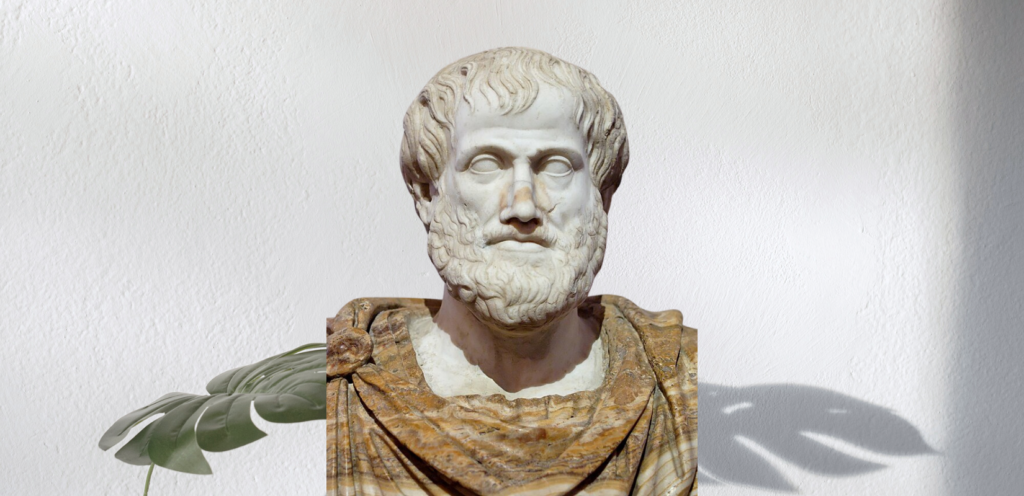
1. Communication Skills
Aristotle
Profession: Philosopher, Scientist
Years Alive: 384–322 BC
Aristotle’s philosophy of communication revolves around the art of persuasion, known as rhetoric. His framework of ethos (credibility), pathos (emotion), and logos (logic) is still highly relevant in today’s world, whether you’re giving a presentation, negotiating a deal, or having a tough conversation. To communicate effectively, Aristotle believed, you must balance these three elements. In modern terms, this means being trustworthy, understanding your audience’s emotions, and backing up your arguments with facts.
Tip to Improve Your Communication Skils
The next time you’re trying to convince someone—whether it’s a colleague or a friend—analyze how well you’re incorporating ethos, pathos, and logos. Are you providing credible sources (ethos)? Are you tapping into their emotions (pathos)? And are you using clear, logical reasoning (logos)? With practice, you’ll find yourself becoming a more persuasive and impactful communicator.
Recommended Books for Communication Skills
- Rhetoric by Aristotle
- Made to Stick by Chip Heath and Dan Heath
- The Emotionally Intelligent Manager by David R. Caruso and Peter Salovey
- How to Win Friends and Influence People by Dale Carnegie
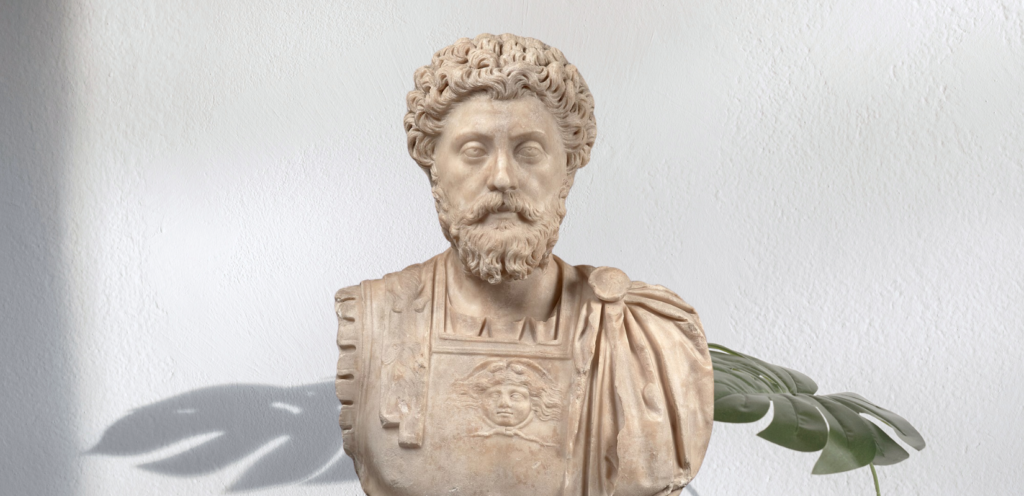
2. Emotional Intelligence
Marcus Aurelius
Profession: Roman Emperor, Philosopher (Stoicism)
Years Alive: 121–180 AD
Marcus Aurelius, one of Rome’s greatest emperors and a leading Stoic philosopher, taught that emotional intelligence stems from understanding and controlling your emotions rather than being controlled by them. His reflections, compiled in Meditations, offer practical Stoic advice on managing emotions and staying grounded amidst chaos. When life throws challenges your way, Marcus would advise focusing only on what you can control, letting go of the rest.
Tip to Improve Your Emotional intelligence
When you feel overwhelmed by stress or anger, take a moment to reflect on what’s truly in your control. Practice journaling your thoughts like Marcus did, and ask yourself how a more rational, calm response could improve the situation. Use this Stoic practice to avoid emotional overreaction.
Recommended Books for Emotional intelligence
- Meditations by Marcus Aurelius
- The Daily Stoic by Ryan Holiday and Stephen Hanselman
- Emotional Intelligence: Why it can Matter More Than IQ by Daniel Goleman

3. Adaptability
Christine de Pizan
Profession: Writer, Poet
Years Alive: c. 1364–c. 1430
Christine de Pizan, a pioneering writer and intellectual during the Renaissance, was one of the first women to make a living from writing. She thrived in a male-dominated society, constantly adapting to societal norms while challenging them through her work on women’s rights and gender equality. Christine’s adaptability was not just in her career but also in her writing, where she adjusted her content and style to suit the ever-changing political landscape. Today, her legacy reminds us of the importance of adjusting to new environments while staying true to our values.
Tip to Improve Your Adaptability
Emulate Christine’s adaptability by embracing change in your life, whether it’s switching careers, learning a new skill, or stepping into unfamiliar territory. Seek out learning opportunities and stay flexible in your goals, but remain anchored to your core beliefs and passions.
Recommended Books for Adaptability
- Who Moved My Cheese by Spencer Johnson
- Mindset: The New Psychology of Success by Carol Dweck
- The Lean Startup by Eric Ries
Related: 8 Amazingly Simple Self Improvement Tips to Get Your Life On Track

4. Problem-Solving
Leonardo da Vinci
Profession: Artist, Scientist, Inventor
Years Alive: 1452–1519
Leonardo da Vinci was a master of observation, creativity, and curiosity, all of which made him an unparalleled problem-solver. Whether sketching designs for flying machines or studying the human body, Leonardo approached problems from multiple angles, combining art, science, and philosophy. His method of tackling challenges can be applied today by encouraging us to think outside the box and embrace interdisciplinary thinking. Leonardo’s approach reminds us that the most innovative solutions often come from looking at a problem through a new lens.
Tip to Improve Your Problem-Solving
The next time you’re stuck on a problem, channel your inner da Vinci by asking different types of questions. Try brainstorming multiple solutions from various perspectives—artistic, logical, and practical. Also, consider keeping a notebook like Leonardo did to sketch ideas or write down observations that can lead to creative breakthroughs.
Recommended Books for Problem-Solving
- How to Think Like Leonardo da Vinci by Michael J. Gelb
- A More Beautiful Question by Warren Berger
- Thinking, Fast and Slow by Daniel Kahneman

5. Leadership
Queen Elizabeth I
Profession: Queen of England
Years Alive: 1533–1603
Queen Elizabeth I’s reign is often cited as a masterclass in leadership. Faced with immense challenges, including political intrigue, international threats, and societal pressure, she maintained control through her keen sense of diplomacy and unwavering confidence. Her leadership style emphasized emotional resilience, strategic thinking, and the ability to inspire loyalty in her followers. In today’s context, these qualities are essential for leading teams, managing projects, and navigating corporate environments. Elizabeth’s balance of assertiveness and empathy remains a model for anyone striving to be an effective leader.
Tip to Improve Your Leadership
The next time you face a leadership challenge, try balancing empathy with authority. Queen Elizabeth I was known for listening to her advisors but also making independent decisions. Practice active listening with your team but trust your judgment when it’s time to make the tough calls. Use a “queenly” mindset by remaining composed under pressure and thinking strategically about long-term goals.
Recommended Books for Leadership
- Leaders Eat Last by Simon Sinek
- The Life of Elizabeth I by Alison Weir
- Dare to Lead by Brené Brown
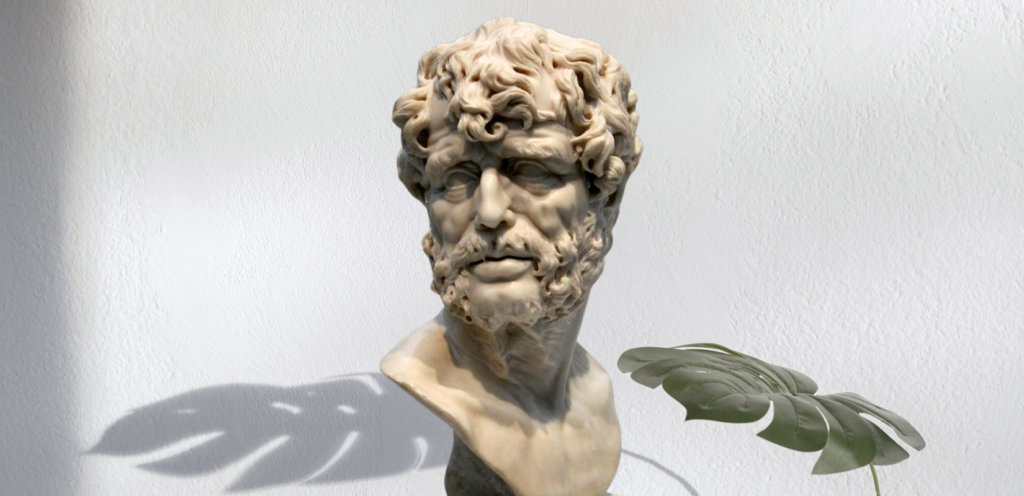
6. Time Management
Seneca
Profession: Philosopher (Stoicism), Statesman, Playwright
Years Alive: c. 4 BC–65 AD
Seneca, a Stoic philosopher, emphasized the fleeting nature of time and the importance of using it wisely. In his essay On the Shortness of Life, Seneca argues that people waste much of their time on trivial matters instead of focusing on meaningful activities. In today’s world, filled with distractions, Seneca’s advice is particularly relevant. His teachings encourage us to focus on what truly matters, cut out distractions, and live with intention.
Tip to Improve Your Time Management
Audit your time for a day and see where it’s being wasted. Are there distractions, like excessive social media use, that eat up valuable hours? Replace these with activities that align with your long-term goals. Ask yourself, “Am I using my time on what truly matters?”
Recommended Books for Time Management
- On the Shortness of Life by Seneca
- Eat That Frog! by Brian Tracy
- Essentialism by Greg McKeown
- The 12 Week Year by Brian P. Moran and Michael Lennington
Related: The 12 Week Year: 3 Major Insights to Take Control of Your Life

7. Self-Confidence
Hatshepsut
Profession: Pharaoh of Egypt
Years Alive: c. 1507–1458 BC
Hatshepsut, one of Ancient Egypt’s most successful pharaohs, ruled with unshakable self-confidence in an era when female rulers were rare. She boldly presented herself as a legitimate pharaoh, even adopting traditionally male titles and iconography to solidify her position. Hatshepsut’s confidence enabled her to lead Egypt into a period of prosperity and construction. Her example is particularly powerful for anyone who faces societal or personal limitations—reminding us that self-belief can transcend external barriers.
Tip to Improve Your Self-Confidence
Take a page from Hatshepsut’s book by affirming your capabilities, even when you feel like an outsider or face opposition. Use positive self-talk and build your self-confidence by taking on challenges that push your boundaries. When you feel hesitant, remind yourself of your past successes and how capable you are of achieving more.
Recommended Books for Self-Confidence
- The Confidence Code: The Science and Art of Self-Assurance—What Women Should Know by Katty Kay and Claire Shipman
- The Gifts of Imperfection by Brené Brown
- Feel the Fear and Do It Anyway by Susan Jeffers
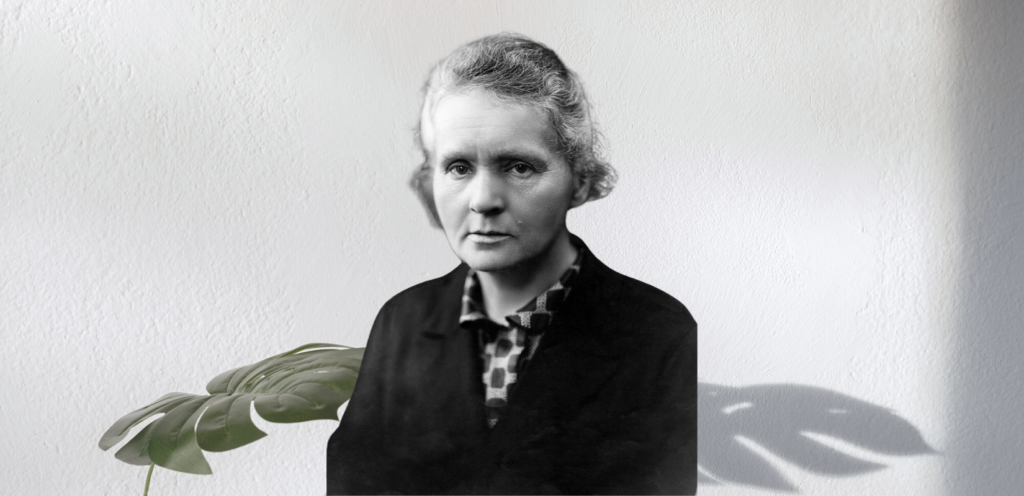
8. Organization
Marie Curie
Profession: Physicist, Chemist
Years Alive: 19th–20th Century CE
Marie Curie, a pioneering physicist and chemist, was not only known for her groundbreaking discoveries but also for her exceptional ability to stay organized amidst the chaos of scientific research. Her meticulous approach to experiments and data collection laid the foundation for her success in isolating radioactive elements. In today’s world, Curie’s approach to organization can inspire us to bring order to our own work, whether it’s managing complex projects or simply keeping our daily tasks on track.
Tip to Improve Your Organization
Create a system for organizing your tasks, projects, or personal goals. Curie’s methodical approach suggests the importance of detailed notes and keeping clear records. Try using a project management tool like Trello or a simple journal to break down larger tasks into smaller, manageable steps. Regularly review and update your progress to stay on top of things.
Recommended Books for Organization
- Marie Curie: A Life by Susan Quinn
- Getting Things Done by David Allen
- Organize Your Mind, Organize Your Life: Train Your Brain to Get More Done in Less Time by Paul Hammerness and Margaret Moore
- The Home Edit: Stay Organized: The Ultimate Guide to Making Systems Stick by Clea Shearer and Joanna Teplin
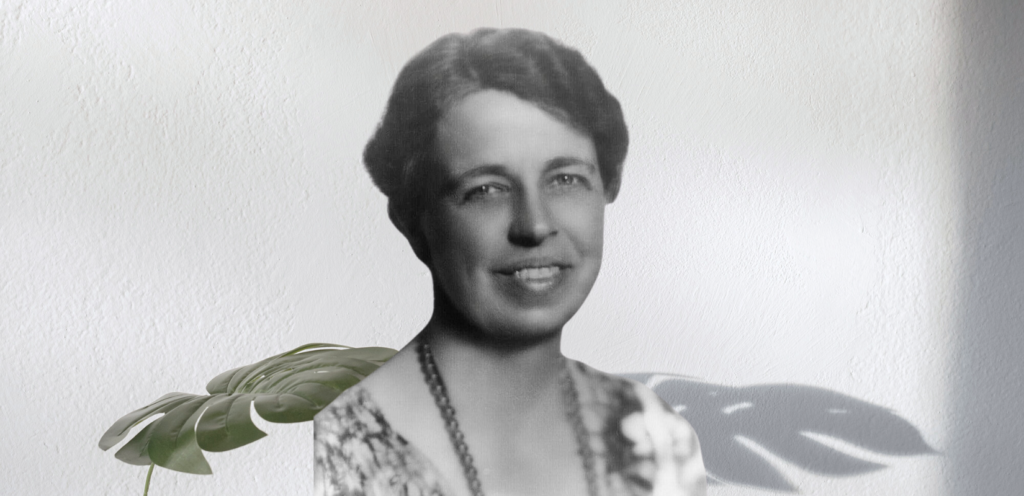
9. Interpersonal Skills
Eleanor Roosevelt
Profession: Diplomat, Activist, First Lady
Years Alive: 1884–1962
Eleanor Roosevelt, one of the most influential women of the 20th century, was admired for her exceptional interpersonal skills. As First Lady of the United States and a humanitarian, she had the ability to connect with people from all walks of life. Roosevelt believed in the power of empathy and advocacy, using her interpersonal skills to champion social causes and bridge divides. In today’s world, her example teaches us the importance of compassion, active listening, and advocating for others in our relationships and communities.
Tip to Improve Your Interpersonal Skills
Practice empathy by stepping into others’ shoes. The next time you engage in a conversation, make a conscious effort to understand the other person’s emotions and point of view. Whether you’re resolving a conflict or simply chatting with a friend, focusing on empathy can strengthen your interpersonal connections.
Recommended Books for Interpersonal Skills
- Eleanor Roosevelt, The Defining Years, 1933-1938 by Blanche Wiesen Cook
- The Empathy Effect by Helen Riess
- How to Talk to Anyone: 92 Little Tricks for Big Success in Relationships by Leil Lowndes
- The Art of Communicating by Thich Nhat Hanh

10. Resilience
Frida Kahlo
Profession: Painter, Artist
Years Alive: 1907–1954
Frida Kahlo, the renowned Mexican artist, is a symbol of resilience through personal adversity. Struggling with chronic pain due to a debilitating bus accident and numerous health issues, Kahlo channeled her suffering into her art, creating deeply personal and powerful works. Her ability to turn hardship into creativity teaches us that resilience is not just about surviving tough times, but about using those experiences as a source of strength and inspiration. Kahlo’s resilience is a reminder to transform pain into purpose, using it as fuel for personal growth and expression.
Tip to Improve Your Resilience
When life feels overwhelming, take a page from Kahlo’s book by finding creative outlets for your pain or frustration. Whether it’s writing, painting, or another form of self-expression, transforming adversity into something meaningful can help you process your emotions and build resilience. Don’t be afraid to share your story with others—it can inspire both you and those around you.
Recommended Books for Resilience
- Frida: A Biography of Frida Kahlo by Hayden Herrera
- Rising Strong by Brené Brown
- Option B by Sheryl Sandberg and Adam Grant
- Grit: The Power of Passion and Perseverance by Angela Duckworth
Related: How to Develop Consistency for Success (with 5 Transformative Tips)
Practical Personal Development Tips from Remarkable Thinkers
History’s greatest thinkers—whether philosophers, artists, leaders, or revolutionaries—offer us timeless insights that transcend their eras. From Aristotle’s lessons on communication to Frida Kahlo’s resilience in the face of pain, these figures didn’t just survive their challenges; they thrived, leaving behind legacies of wisdom that still apply today.
What makes these lessons so powerful is their accessibility—they’re not confined to textbooks or academic discussions. By looking to the past, we can uncover unconventional, yet profoundly effective, personal development strategies that stand the test of time.
Now, it’s up to you to put these lessons into practice!
Leave a comment below: What is your favorite unconventional personal development tip that you apply to your life?
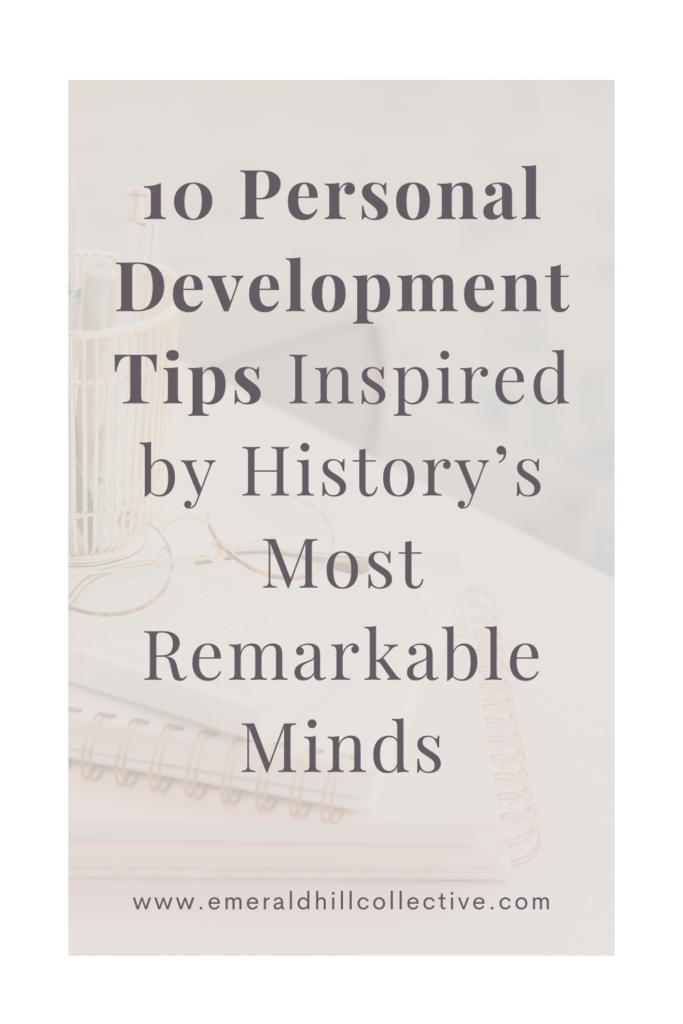
Leave a Reply